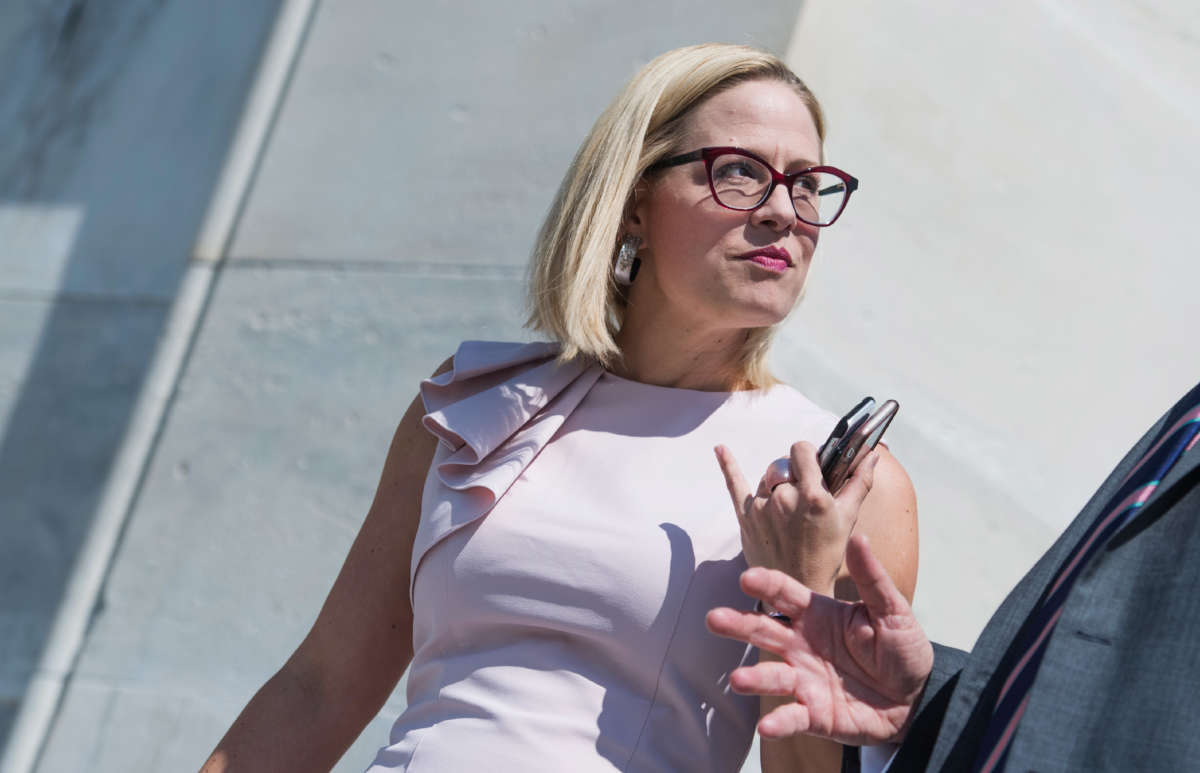Did you know that Truthout is a nonprofit and independently funded by readers like you? If you value what we do, please support our work with a donation.
Progressives in Arizona are trying to push Sen. Kyrsten Sinema (D-Arizona) to embrace the elimination of the filibuster, encouraging her to abandon support for the archaic legislative procedural rule by demonstrating that most voters in her state don’t want the filibuster to remain in place.
After Democrats took control of the United States Senate (with a 50-50 tie in the legislative chamber being broken by Vice President Kamala Harris), Sinema expressed a desire to keep the filibuster in place, which grants any senator the ability to keep debate on a bill going until a 60-member cloture vote can come about.
In a statement she made to The New York Times, Sinema said that the filibuster is “meant to protect what the Senate was designed to be: a place where senators come together, find compromise and get things done for our country.” But as reporting from the Times pointed out, the filibuster isn’t what most people think it is — rather than being the “impassioned objection” that’s made by a lawmaker on the Senate floor (as some movies or television shows have portrayed it), it is instead a method by which a senator can prevent a bill from moving forward without obtaining a supermajority 60-vote threshold.
Brianna Westbrook, a former vice chair of the Arizona Democratic Party, disagreed with Sinema’s sentiments. Sharing a video on Twitter of Sinema when she was a member of the House of Representatives, Westbrook, using Sinema’s own words in the clip, said she and others would be engaged in trying to convince the senator to abandon her attempts to protect the filibuster.
“Rep. Kyrsten Sinema is right: ‘things are so bad’ in Arizona, so we are organizing a collective movement to push Sen. Kyrsten Sinema to fix the problem of the Senate Filibuster… by ending it,” Westbrook wrote.
Westbrook, who unsuccessfully ran for a seat in Congress in 2018, also encouraged voters in Arizona to call Sinema directly to tell her to vote to end the Senate rule. She shared results from a Data for Progress poll in the state, conducted in February, that demonstrated Arizona residents vastly favored doing away with the practice if it meant major legislation wouldn’t be obstructed.
When voters were asked in the poll which was more important, preserving traditional Senate procedures and rules versus passing major legislation “to address the problems we face as a nation,” more than three out of five respondents (61 percent) said they preferred the latter, with only 26 percent saying they wanted to keep procedural obstacles like the filibuster in place.
That opinion transcended party lines, too. While 76 percent of Democrats were approving of ending Senate rules like the filibuster if it meant passing major bills, 66 percent of independents in Arizona said they backed the idea as well. And while the plurality of Republican respondents (43 percent) said they would rather keep those rules in place, a nearly identical number (42 percent) said they’d be fine with getting rid of those Senate rules, too.
Beyond Westbrook’s push to get Sinema to change her mind on the filibuster, there are other efforts from progressives to convince the senator that the practice needs to go — including the possibility that she will need to be replaced if she doesn’t change her views.
No Excuses PAC, a political action committee started by organizers who helped Rep. Alexandria Ocasio-Cortez (D-New York) win her first congressional race, announced earlier this year it was actively trying to find progressive candidates to run against Sinema, as well as Sen. Joe Manchin (D-West Virginia), who also opposes getting rid of the Senate rule. Voters in Arizona and West Virginia “care more about jobs and their community and money in their pockets than they do about an arcane Senate rule called the filibuster,” Saikat Chakrabarti, one of the PAC’s founders, said in February.
In a fundraising email describing their efforts, No Excuses PAC likened Sinema’s and Manchin’s defense of the filibuster to a recurring theme in the popular Sunday comics, “Peanuts.”
Sinema and Manchin “have both pledged to help Republicans to negotiate their own party down from real solutions to half measures in the name of ‘bipartisanship…. They are like Lucy with the football, and Democrats have predictably played Charlie Brown every time – – until now,” that email said. “Finally, we have a Democratic president and Congressional leadership who are not falling for it. Now the only thing stopping them from taking the fall again, in a 50/50 Senate, are Joe Manchin and Kyrsten Sinema.”
Media that fights fascism
Truthout is funded almost entirely by readers — that’s why we can speak truth to power and cut against the mainstream narrative. But independent journalists at Truthout face mounting political repression under Trump.
We rely on your support to survive McCarthyist censorship. Please make a tax-deductible one-time or monthly donation.
